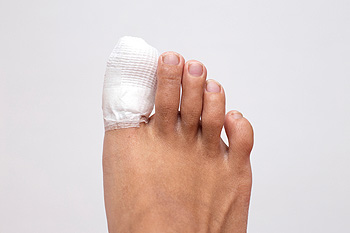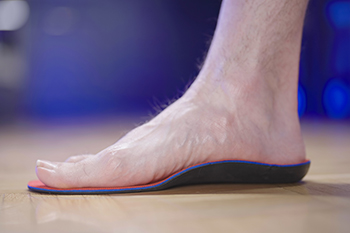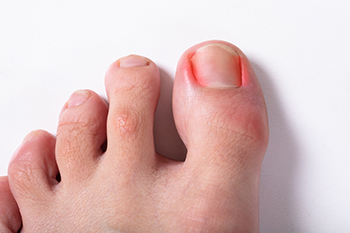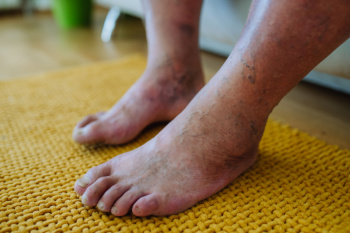
Runners, meet your game-changer: Custom Orthotics. Every stride matters, and with Custom Orthotics, you can ensure optimal foot alignment, reducing stress on joints and muscles. They help absorb shock, protect against injuries, and can even enhance your running efficiency. Whether you're sprinting short distances or conquering marathons, Custom Orthotics provide the support and balance your feet crave. Call today for more information.

A broken toe might seem minor, but it can be surprisingly painful and disruptive. Toe fractures happen from direct impact, like stubbing a toe on furniture, dropping something heavy on it, or even excessive stress from repetitive movements. There are different types of toe fractures. A stress fracture develops over time from repeated strain, common in runners and athletes. A non-displaced fracture means the bone has cracked but remains aligned, while a displaced fracture occurs when the bone shifts out of place. A comminuted fracture involves multiple breaks in the same bone, and an open fracture means the bone has pierced the skin, requiring immediate medical attention. Treatment depends on severity, ranging from taping the injured toe to its neighbor for stability to wearing a stiff-soled shoe. Severe cases may require a splint or even surgery to ensure proper healing. If you have severe pain from a broken toe, it is strongly suggested that you schedule an appointment with a podiatrist for appropriate treatment.
A broken toe can be very painful and lead to complications if not properly fixed. If you have any concerns about your feet, contact Richard Galperin, DPM from Texas. Our doctor will treat your foot and ankle needs.
What to Know About a Broken Toe
Although most people try to avoid foot trauma such as banging, stubbing, or dropping heavy objects on their feet, the unfortunate fact is that it is a common occurrence. Given the fact that toes are positioned in front of the feet, they typically sustain the brunt of such trauma. When trauma occurs to a toe, the result can be a painful break (fracture).
Symptoms of a Broken Toe
- Throbbing pain
- Swelling
- Bruising on the skin and toenail
- The inability to move the toe
- Toe appears crooked or disfigured
- Tingling or numbness in the toe
Generally, it is best to stay off of the injured toe with the affected foot elevated.
Severe toe fractures may be treated with a splint, cast, and in some cases, minor surgery. Due to its position and the pressure it endures with daily activity, future complications can occur if the big toe is not properly treated.
If you have any questions please feel free to contact our office located in Dallas, TX . We offer the newest diagnostic and treatment technologies for all your foot and ankle needs.

Foot orthoses play an important role in improving balance and stability for older adults, reducing the risk of falls and enhancing mobility. As individuals age, changes in muscle strength, joint flexibility, and sensory perception can affect walking patterns and increase instability. Orthotic devices provide proper arch support, cushioning, and alignment, which help distribute weight evenly and reduce strain on the feet and lower limbs. By promoting better posture and foot positioning, orthoses enhance proprioception, allowing for more confident and controlled movements. They also help absorb shock, reducing discomfort and fatigue during walking. With improved balance and stability, older adults can move more safely and comfortably, maintaining an active and independent lifestyle. If you have noticed balance issues, it is suggested that you contact a podiatrist who can determine the cause and discuss orthotics as part of the treatment plan.
If you are experiencing discomfort in your feet and would like to try custom orthotics, contact Richard Galperin, DPM from Texas. Our doctor can provide the care you need to keep you pain-free and on your feet.
What Are Custom Orthotics?
Custom orthotics are inserts you can place into your shoes to help with a variety of foot problems such as flat feet or foot pain. Orthotics provide relief and comfort for minor foot and heel pain.
Over-the-Counter Inserts
Shoe inserts come in a wide variety and are used to treat foot pain, heel pain, and minor problems. For example, arch supports can be inserted into your shoes to help correct overarched or flat feet, while gel insoles are often used because they provide comfort and relief from foot and heel pain by alleviating pressure.
Prescription Orthotics
If over-the-counter inserts don’t work for you or if you have a more severe foot concern, it is possible to have your podiatrist prescribe custom orthotics. These high-quality, custom inserts are designed to treat problems such as abnormal motion, plantar fasciitis, and severe forms of heel pain. They can even be used to help patients suffering from diabetes by treating foot ulcers and painful calluses and are usually molded to your feet individually, which allows them to provide full support and comfort.
If you're experiencing minor to severe foot or heel pain, it’s recommended to speak with your podiatrist about the possibility of using custom orthotics or shoe inserts. A podiatrist can determine which type of custom orthotic or shoe insert is right for you and help you take the first steps toward being pain-free.
If you have any questions please contact our office located in Dallas, TX . We offer the newest diagnostic and treatment technologies for all your foot and ankle needs.

Custom orthotics can be used to relieve foot pain and discomfort. They're also used to treat various foot conditions and deformities. Flat feet, bunions, and Morton's neuroma are just a few of the foot conditions that have been known to benefit from the use of orthotics.
Comfy feet are happy feet! Contact us today.

An ingrown toenail occurs when the edge of the nail grows into the surrounding skin, leading to discomfort and irritation. Early symptoms include tenderness and redness along the side of the nail. As the condition progresses, swelling and increased pain may develop, especially when pressure is applied. The affected area may feel warm and become sensitive to touch. In some cases, the skin around the nail may appear swollen or inflamed due to irritation. If left untreated, an infection can form, leading to pus drainage and more intense pain. Walking or wearing shoes may become uncomfortable as the nail continues to press into the skin. If you have any of the above symptoms, it is suggested that you schedule an appointment with a podiatrist who can accurately diagnose and treat ingrown toenails.
Ingrown toenails can become painful if they are not treated properly. For more information about ingrown toenails, contact Richard Galperin, DPM of Texas. Our doctor can provide the care you need to keep you pain-free and on your feet.
Ingrown Toenails
Ingrown toenails occur when a toenail grows sideways into the bed of the nail, causing pain, swelling, and possibly infection.
Causes
- Bacterial infections
- Improper nail cutting such as cutting it too short or not straight across
- Trauma to the toe, such as stubbing, which causes the nail to grow back irregularly
- Ill-fitting shoes that bunch the toes too close together
- Genetic predisposition
Prevention
Because ingrown toenails are not something found outside of shoe-wearing cultures, going barefoot as often as possible will decrease the likeliness of developing ingrown toenails. Wearing proper fitting shoes and using proper cutting techniques will also help decrease your risk of developing ingrown toenails.
Treatment
Ingrown toenails are a very treatable foot condition. In minor cases, soaking the affected area in salt or antibacterial soaps will not only help with the ingrown nail itself, but also help prevent any infections from occurring. In more severe cases, surgery is an option. In either case, speaking to your podiatrist about this condition will help you get a better understanding of specific treatment options that are right for you.
If you have any questions please feel free to contact our office located in Dallas, TX . We offer the newest diagnostic and treatment technologies for all your foot and ankle needs.

Proper foot care is imperative for people with diabetes, as the condition can lead to poor circulation, nerve damage, and increased risk of infections. Symptoms like numbness, tingling, or a loss of sensation in the feet can make it difficult to notice injuries or sores. Diabetes can also cause skin changes, making the feet more prone to cuts, blisters, or fungal infections. To protect your feet, it is important to regularly check for sores, cuts, or blisters, and keep your feet clean and dry. Wearing well-fitting shoes, avoiding walking barefoot, and moisturizing dry skin can help prevent issues. If you smoke, it is important to stop, as smoking worsens circulation and increases the risk of complications. A podiatrist can help with regular foot exams, treating infections, and providing advice on proper footwear and diabetic foot care. If you are diabetic and have foot issues, it is suggested that you are under the care of a podiatrist, who can regularly monitor this condition.
Diabetic foot care is important in preventing foot ailments such as ulcers. If you are suffering from diabetes or have any other concerns about your feet, contact Richard Galperin, DPM from Texas. Our doctor can provide the care you need to keep you pain-free and on your feet.
Diabetic Foot Care
Diabetes affects millions of people every year. The condition can damage blood vessels in many parts of the body, especially the feet. Because of this, taking care of your feet is essential if you have diabetes, and having a podiatrist help monitor your foot health is highly recommended.
The Importance of Caring for Your Feet
- Routinely inspect your feet for bruises or sores.
- Wear socks that fit your feet comfortably.
- Wear comfortable shoes that provide adequate support.
Patients with diabetes should have their doctor monitor their blood levels, as blood sugar levels play such a huge role in diabetic care. Monitoring these levels on a regular basis is highly advised.
It is always best to inform your healthcare professional of any concerns you may have regarding your feet, especially for diabetic patients. Early treatment and routine foot examinations are keys to maintaining proper health, especially because severe complications can arise if proper treatment is not applied.
If you have any questions please feel free to contact our office located in Dallas, TX . We offer the newest diagnostic and treatment technologies for all your foot and ankle needs.
